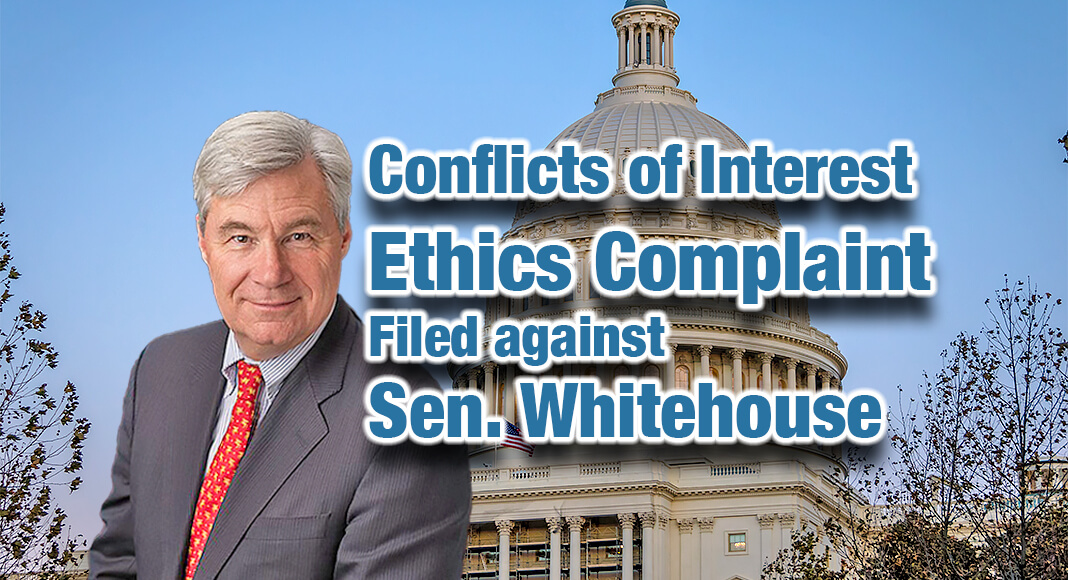
Judicial Watch
Washington, DC– Judicial Watch announced today that it hand-delivered an ethics complaint to Chairman Christopher A. Coons (D-CT) and Vice Chairman James Lankford (R-OK) of the Senate Select Committee on Ethics calling for a full investigation into potential ethics violations tied to Senator Sheldon Whitehouse (D-RI) abusing his office to benefit himself and his wife.
“There is strong evidence that Senator Sheldon Whitehouse may have violated Senate ethics conflicts of interest rules. The Senate Ethics Committee should immediately investigate this serious issue:” stated Judicial Watch President Tom Fitton. “Senator Whitehouse seems to have stepped over the line of standard environmental legislative advocacy and used his Senate office to advance his and his wife’s personal and financial interests.”
Judicial Watch argues in support of an investigation:
The publicly available facts suggest that Senator Whitehouse’s legislative activity, particularly his sponsorship of environmental legislation funding his wife’s clients and her specific area of expertise (marine spatial planning), creates a reasonable appearance of a conflict of interest. Given this, further investigation regarding Mrs. Whitehouse’s consulting activities, aided by the Committee’s subpoena power, is warranted.
Senator Whitehouse’s wife, Sandra Thornton Whitehouse, is the president of Ocean Wonks, LLC, a for-profit limited liability environmental consulting company that was chartered (in 2017) and has its principal place of business in Rhode Island. Shortly after her husband’s election to the Senate in 2009, Mrs. Whitehouse (and later her company Ocean Wonks) became a consultant to at least two known 501(c)(3) nonprofit corporations focused on environmental issues – Ocean Conservancy (OC) and AltaSea.
Influence Watch found Mrs. Whitehouse’s made slightly over $2.6 million in total compensation from OC over the twelve-year period since FY 2009. Her present level of compensation would make Mrs. Whitehouse the eighth highest earner among OC employees, higher than several OC Vice Presidents.
According to a May 2023 report by The Daily Caller, since his election to the Senate, “Whitehouse has introduced at least 24 ocean-related bills and co-founded the Senate Oceans Caucus in 2011.”
The letter provides a partial list of ten pieces of legislation sponsored or cosponsored by Senator Whitehouse. The five pieces of legislation listed below, which have been enacted into law, likely would (or did) benefit his wife and her environmental clients:
(1) Save Our Seas (“SOS”) Act (ENACTED)
- Signed into law by President Trump in 2018
- Allows NOAA Administrator to declare severe marine debris events and authorize funds to assist with cleanup and response; reauthorizes NOAA Marine Debris Program through FY2022, which supports research on sources of marine debris provides funds to prevent and clean up marine debris at a level of $10 million annually
- Strongly supported by Ocean Conservancy
- Benefitted Ocean Conservancy, which operates extensive ocean debris cleanup operations. For example. Ocean Conservancy, in “partnership” with leftwing environmental private equity firm Circulate Capital, obtained a $35 million, 50% loan portfolio guarantee from USAID to incentivize business development and infrastructure in the “recycling value chain” in South and Southeast Asia. Senator Whitehouse made remarks at the formal launch event for the OC-Circulate Capital partnership at the Wilson Center in D.C.
- OC’s “partner” in this endeavor, Circulate Capital, lists OC’s CEO, Janis Searles Jones, as one of its “Advisors” on its website
(2) Save Our Seas 2.0 Act (“SOS 2.0”) (ENACTED)
- Signed into law by President Trump in 2020
- Established a Marine Debris Response Trust Fund to provide money/resources to respond to marine events; authorized a Genius Prize to support advancements in marine cleanup, packaging, detection, and other designs; created a Marine Debris Foundation to support marine debris efforts globally; conduct new studies to create or expand programs addressing marine debris
- Provided $103 million in FY21 and FY22 funding to support 14 new country and regional programs strongly supported by Ocean Conservancy
- Benefitted Ocean Conservancy, which operate extensive international ocean debris cleanup operations. For example, OC received the largest NOAA Marine Debris Program grant awarded in 2021, totaling $631,770 for work to reduce abandoned, lost, and discarded fishing gear. In 2022, OC again received the highest NOAA Marine Debris Program grant awarded, totaling $361,395, to work with restaurants and convenience stores in Miami-Dade County, Florida, to reduce marine debris.
(3) Offshore Wind Incentives for New Development (WIND) Act (ENACTED)
- Became law as part of the Inflation Reduction Act (“IRA”) of 2022
- The Act “extend[s] the 30 percent Investment Tax Credit for offshore wind through 2025”
- The Act’s passage benefitted Deepwater Wind’s Block Island wind farm
(4) National Ocean Exploration Act (ENACTED)
- Enacted into law as part of the FY23 National Defense Authorization Act (NDAA)
- The law requires NOAA to undertake comprehensive ocean mapping, formally authorize and improve the existing National Ocean Mapping, Exploration and Characterization Council, and authorizes additional appropriation of $1.4 billion for NOAA’s existing Ocean Exploration and Research Program, its Ocean and Coastal Mapping Program, and its Hydrographic Surveying Program.
- Supported by Ocean Conservancy and directly benefits OC’s marine spatial program headed by Mrs. Whitehouse
(5) National Oceans & Coastal Security Act (ENACTED)
- Enacted into law as part of the 2015 budget bill
- Established the National Oceans and Coastal Security Fund (now known as the National Coastal Resilience Fund), operated by NOAA, to provide grants for programs and activities designed to protect, conserve, and restore ocean and coastal resources and coastal infrastructure
- The National Coastal Resilience Fund has provided over $466 million in grants since its inception
- Strongly supported by OC, which has “partnered” with NOAA “since the inception of NOAA’s marine debris program (MDP) in 2006, including partnership on OC’s International Coastal Cleanup and its Talking Trash & Taking Action education program
The ethics complaint details the Senate Ethics Rule at issue in the Whitehouse matter:
Paragraph one of Senate Ethics Rule 37 states, “A Member . . . shall not receive any compensation, nor shall he permit any compensation to accrue to his beneficial interest from any source, the receipt or accrual of which would occur by virtue of influence improperly exerted from his position as a Member, Officer, or employee.” Paragraph four of Rule 37 further declares that a Senator shall not “knowingly use his official position to introduce or aid the progress or passage of legislation, a principal purpose of which is to further only his pecuniary interest, only the pecuniary interest of his immediate family, or only the pecuniary interest of a limited class of persons or enterprises, when he, or his immediate family, or enterprises controlled by them, are members of the affected class.
Rule 37’s prohibition on conflicts of interest are designed to be broad and robust. The Nelson Report accompanying passage of the ethics rules states that the prohibitions on conflicts of interest are “specifically designed to prevent conflict of interest, or the appearance of such conflict of interest, which is equally damaging to public confidence.” Rule 37 thus “prohibits a member . . . from working for legislation, a principal purpose of which is to enhance his financial interest or the interest of his family.”
Paragraph one was intended “as a broad prohibition against members . . . deriving financial benefit, directly or indirectly, from the use of their official position.” It is broader than quid pro quo bribery, “For example. If a Senator . . . intervened with an executive agency for the purpose of influencing a decision which would result in measurable personal financial gain to him, the provisions of this paragraph would be violated.” Thus, if a Senator uses his official position in a manner that benefits him “indirectly” through his spouse, such spousal compensation would “accrue to his beneficial interest” and violate Paragraph one.
The letter finally asks for robust investigation of Senator Whitehouse’s apparent conflict of interest:
Given Senator Whitehouse’s longstanding practice of sponsoring or cosponsoring legislation that directly benefits his wife and/or her clients, we urge the Senate Ethics Committee to conduct a preliminary investigation to disinter the full extent of Mrs. Whitehouse’s consulting activities, with both for-profit and nonprofit entities, that may create a reasonable appearance of a conflict of interest with Senator Whitehouse’s official duties.
















